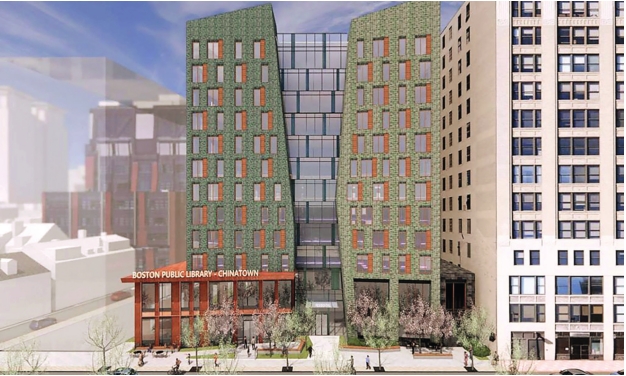
A new full-service library is coming to Chinatown, offering residents expanded resources, multilingual services, and spaces for cultural and educational programs.
The Boston Public Library (BPL) plans to open the branch in a new high-rise building at 49 Hudson Street that’s expected to be completed late in 2027 or early 2028.
The library’s core service area will extend from Chinatown to Bay Village, the Leather District and Downtown Crossing. An extended service area includes the portion of the South End immediately across the Massachusetts Turnpike from Chinatown, bounded by East Berkeley, Tremont and Albany streets, though the library will be broadly accessible to the general public.
The new branch will feature a collection of books, digital resources, and materials in multiple languages, including English, Mandarin, and Cantonese.
The facility is designed to serve as both a library and a community hub, with flexible meeting rooms, quiet study areas, and dedicated spaces for children and families. Programming will include literacy workshops, after school activities, digital literacy classes, and cultural events, all tailored to the neighborhood’s diverse population.
However, as far back as 2017, the continuous construction of high-rise apartment buildings in the neighborhood has raised concerns with the gentrification of the area’s historically Asian population.
The increased cost of living, associated with high-rises like the one that will house the new library, has led to an increase in the proportion of white and non-Asian resident population in Chinatown. Even early plans for the library understood that housing costs could push out the community that the library planned to serve.
As such, the Boston Planning and Development Agency has designated the Asian Community Development Corporation for the site’s redevelopment. Currently, the proposed project will consist of 110 affordable residential units available for rental and ownership.
The design and services of the branch have been shaped by extensive input from local residents. Community members participated in surveys, workshops, and public meetings over several years, providing feedback on what the library should offer and how it should be configured. Many residents emphasized the importance of multilingual services, accessible technology, and spaces for multi-generational neighborhood gatherings.
Plans for the two-floor 17,000 square-foot facility include an extensive Chinese language collection, dedicated spaces for children, teens and adults, and presentations of Chinese culture, music and readings.
The announcement marks a milestone in a decades long effort to restore a permanent library to Chinatown. The original branch closed in the 1950s during urban renewal projects that displaced many residents and left the neighborhood without convenient library access. A temporary library opened in 2018 to provide limited services, but community advocates long argued that it could not meet the needs of the growing and diverse population.
In a news bulletin advertising the public groundbreaking event, Friends of the Chinatown Library elaborated on the need for a permanent branch of the BPL in the neighborhood, saying, “Libraries are the most accessible gateways to learning about information and resources, to social interactions, and to democracy. A library is an especially critical educational institution for a neighborhood like Chinatown, whose residents have high poverty rates, are largely immigrants with limited formal education, and include many English learners.”